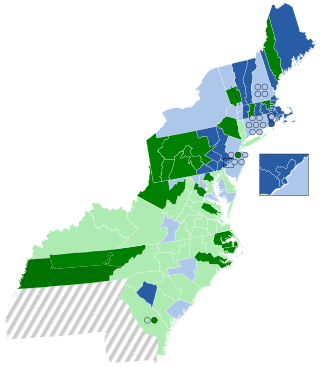
The 1822–23 United States House of Representatives elections were held on various dates in various states between July 1, 1822 and August 14, 1823. Each state set its own date for its elections to the House of Representatives before the first session of the 18th United States Congress convened on December 1, 1823. They occurred during President James Monroe's second term.
The 1820–21 United States House of Representatives elections were held on various dates in various states between July 3, 1820 and August 10, 1821. Each state set its own date for its elections to the House of Representatives before the first session of the 17th United States Congress convened on December 3, 1821. They coincided with President James Monroe winning reelection unopposed.
The 1818–19 United States House of Representatives elections were held on various dates in various states between April 26, 1818 and August 12, 1819. Each state set its own date for its elections to the House of Representatives before the first session of the 16th United States Congress convened on December 6, 1819. They occurred during President James Monroe's first term. Also, newly admitted Alabama elected its first representatives in September 1819, increasing the size of the House to 186 seats.

The 1808–09 United States House of Representatives elections were held on various dates in various states between April 26, 1808 and May 5, 1809. Each state set its own date for its elections to the House of Representatives before the first session of the 11th United States Congress convened on May 22, 1809. They coincided with James Madison being elected as president. Elections were held for all 142 seats, representing 17 states.

The 1798–99 United States House of Representatives elections were held on various dates in various states between April 24, 1798 in New York and August 1, 1799 in Tennessee. Each state set its own date for its elections to the House of Representatives, with some after the official start of the 6th United States Congress on March 4, 1799, but before the start of the first session of this Congress in Philadelphia on December 2, 1799. These elections were held during President John Adams term. It was the last congressional session before the move to the new capital at Washington, D.C. Elections were held for all 106 seats, representing 16 states.

The 1794–95 United States House of Representatives elections were held on various dates in various states between August 25, 1794, and September 5, 1795 (Kentucky). Each state set its own date for its elections to the House of Representatives before the first session of the 4th United States Congress convened on December 7, 1795. They were held during President George Washington's second term. Elections were held for all 105 seats, representing 15 states.

The 1792–93 United States House of Representatives elections were held on various dates in various states between August 27, 1792 and September 6, 1793. Each state set its own date for its elections to the House of Representatives before the first session of the 3rd United States Congress convened on December 2, 1793. With the addition of the new state of Kentucky's representatives, and the congressional reapportionment based on the 1790 United States Census, the size of the House increased to 105 seats.

Although Maine neither gained nor lost seats after the 1820 United States Census, redistricting placed two incumbents into the 3rd district. Maine elected its members on April 7, 1823, after the term began but before the new Congress convened. Maine law required a majority for election, with additional ballots taken if a majority were not achieved. This proved necessary in 1823 in the 1st, 3rd, 4th, and 6th districts, but all members were still chosen before the new Congress convened.

A special election was held in Delaware's at-large congressional district on October 1, 1822 to fill a vacancy left by the resignation of Caesar A. Rodney (DR) on January 24, 1822, having been elected to the Senate. This election was held on the same day as the general elections for Congress in Delaware.

On July 25, 1822, William Hendricks (DR) of Indiana's at-large district resigned to run for Governor of Indiana. Hendricks had represented the state since it was first admitted to the Union.

On October 13, 1821, before the first meeting of the 17th Congress, Wingfield Bullock (DR) of Kentucky's 8th district died. A special election was held to fill the resulting vacancy.

On January 14, 1822, Solomon Van Rensselaer (DR) of New York's 9th district resigned to accept a position as Postmaster of Albany. A special election was held February 25–27, 1822.
In 1821, Representative-elect John S. Richards (DR), who'd been elected to represent South Carolina's 9th district, declined to serve. A special election was held to fill the resulting, the first of two special elections in the 9th district for the 17th Congress.
On May 8, 1822, James Blair (DR) of South Carolina's 9th district resigned. A special election was held to fill the resulting vacancy. Blair himself had been elected in a special election earlier in the same Congress.
On May 8, 1822, William Lowndes (DR) of South Carolina's 2nd district resigned. A special election was held to fill the resulting vacancy

On May 8, 1822, the last day of the First Session of the 17th Congress, William Milnor (F) of Pennsylvania's 1st district resigned. A special election was held to fill the resulting vacancy on October 1, 1822, a week before the general elections for the 18th Congress.

On May 8, 1822, the last day of the First Session of the 17th Congress, Henry Baldwin (DR) of Pennsylvania's 14th district resigned from Congress. A special election was held on October 1, 1822 to fill the resulting vacancy.

On May 20, 1822, Samuel Moore (DR) of Pennsylvania's 6th district resigned. A special election was held on October 1, 1822 to fill the resulting vacancy.

On October 17, 1822, Ludwig Worman (F) of Pennsylvania's 7th district died in office. A special election was held to fill the resulting vacancy on December 10, 1822











